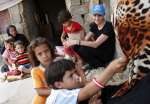On the Road: One family's exhausting journey from Kobani to northern Iraq
News Stories, 29 October 2014
QUSHTAPA REFUGEE CAMP, Iraq, October 29 (UNHCR) – Tarifa shepherds her hungry and tired family after they arrive by minibus at this refugee camp in northern Iraq more than two weeks after fleeing their home in the Syrian city of Kobani.
More than 190,000 Syrians from Kobani have escaped to neighbouring Turkey since the ISIS group launched an offensive to capture the border city in September. Of these, close to 14,000 refugees, including 40-year-old Tarifa and nine relatives aged three months to 60 years, have continued on to Iraq's Kurdistan region. They join some 215,000 others who have arrived there since the start of Syria's civil war in 2011.
Tarifa is on one of 11 minibuses, packed with Syrian Kurds, that arrive two hours after nightfall at the Qushtapa Refugee Camp in Erbil governorate. Many of the new arrivals appear dazed and confused as they follow directions amplified through a megaphone. Children cry in their mothers' arms.
Staff from the Danish Refugee Council, which manages the camp for UNHCR, are there to greet them along with UNHCR protection staff. The new arrivals register to receive blankets, mattresses, pillows, soap, toothbrushes and paste, and plastic sheeting. They are then directed to a large communal tent, where most will spend the night.
Tarifa and her family cram everything into four sacks. They are wearing mostly donated clothes because they had only had time to grab their ID documents and a few small belongings in their rush to leave Kobani. "We didn't even have time to lock the front door," says Tarifa's sister-in-law Nawroz. "We are exhausted, but we are more fortunate than most. Our entire family is safe."
The oldest member of the family, 60-year-old Luqman, had to be carried across the Syria-Turkey border because he was ill. Like so many others who chose to move on to Iraq rather than staying in Turkey, the family has relatives in northern Iraq's Kurdistan region, and there's the added attraction of legally being allowed to work in Iraq.
It is one reason why many of those arriving in Iraq from Kobani are not staying in refugee camps. They frequently spend one night on arrival, then depart the next morning to stay with family or friends, or to move to a city where work is available.
Less than an hour after arriving at Qushtapa, Tarifa and her family are settling into their family tent for the night. A motor tricycle pulls up with two immense pots filled with steaming rice and tomato stew. The family members sit on plastic sheeting and tuck into their second hot meal in Iraq since their arrival at the border this morning. A doctor and nurse enter the tent and check on Tarifa, who complains of a cough.
"It's going as well as we can hope," says Whycliffe Songwa, a senior UNHCR field coordinator. "We have enough space for the current arrivals, but we are concerned that if their numbers should increase dramatically, shelter could become an issue."
In addition to the population movements from Syria, conflict has left some 1.8 million Iraqis displaced by internal conflict since January. More than half have come to the Kurdistan region. With this new influx from Syria, contingency plans for refugee arrivals include the possible expansion of two refugee camps.
Like almost half of the new arrivals, Tarifa and her family haven't planned on staying in a camp. "I'm still in shock from all that has happened," she says. "I can't yet think about making decisions. God willing, we will go back to Syria." But by midnight, just as another nine buses arrive from the border, a decision is made. They pack up their meagre belongings, and drive off with relatives to find temporary shelter in a nearby city.
By Bathoul Ahmed and Ned Colt in Qushtapa Refugee Camp, Iraq


































